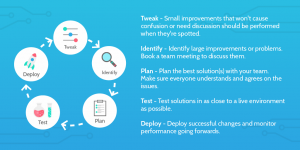By Sara Sabin
The traditional method of assessing employee performance is the end of year review. Unfortunately, experts have found that this method is simply not effective in ensuring that employees reach their optimal performance levels. According to Gallup, only 14% of employees strongly agree their performance reviews inspire them to improve.
In other words, the annual review is not fit for purpose. It does not help employees become better at their jobs. Here’s why annual reviews don’t work, and what to do instead.
Firstly, many employees treat annual reviews as a box to tick off their to-do list. This means that they often don’t put the necessary time and thought into how they’ve performed over the course of year, what their improvement and development areas might be, and how they would like to operate moving forward.
Another reason annual reviews fall short is because connecting with team members once a year just doesn’t cut it. It’s difficult and time consuming to think back over a full year of work. Much harder than it would be if performance was regularly looked at.
Third, if there is a problem with performance, it does not make sense to wait a full year to address the issue. What I have found is that employees are often surprised by what their manager thinks of their performance at the end of the year, because nothing (or very little) has been addressed directly prior to that conversation. By the time specific scenarios are brought up in an annual review, they’re usually in the distant past.
Fourth, annual reviews often don’t address the problem of the “perception gap.” When expectations are unclear and when what a “good” performance looks like is ill defined, it can be hard for an employee to gauge whether they’re doing well or not. This kind of expectation setting is helpful when you have regular, recent examples to refer to.
Here are three things that companies can institute to get the result they’re looking for, without wasting time on annual reviews.
Regular reviews
Expectations are often not clearly defined when we start a new job. A job description does not tell an employee what is expected of them in the day to day, what “excellence” looks like, and what support is needed to continuously improve.
Clarifying these things is a great place to start improving any review process. A team should be aligned on what “excellence” looks like and how to get there.
Then, creating regular check-ins to praise what the employee is doing exceptionally well; and look at what is not going so well, so that employees are not left to sink or swim without the support they need.
The benefit of doing these check-ins regularly is that you can course correct, if needed. Regular check-ins can also provide a forum where an employee can learn from their mistakes. Plus, if a particular area needs development, then, regular checks-ins create a forum for discussing what support is needed and an opportunity to provide that support, before problems arise.
Train managers
A lot of problems arise as a result of managers being inadequately trained on how to have the kind of conversations with employees that actually yield results in terms of their performance.
So, as well as encouraging managers to have regular check-ins, it’s important to ensure that managers are trained on how to conduct them, otherwise managers can do more harm than good. Role playing is often helpful for showing managers what a positive conversation looks like.
Managers need to get to know their team and that means having real conversations. Managers should ask team members: What are their goals? What are they great at doing? What are they not so great at doing? What do they care most about?
The answers to these questions are essential to tapping into the internal motivators of their team; and being able to create the “win win” situation, where the employee sees a link between their goals and the goals of the company.
Once that is established, it becomes easier for managers to talk about expectations, defining good performance and progress.
Honest feedback
When a relationship is based on trust, it creates an environment where honest feedback can be given on a regular basis, without anyone feeling attacked.
By creating regular feedback opportunities (and seeking feedback from their team as well), managers model the leadership behaviors that contribute to truly effective performance.
If managers are confrontation averse, they might avoid telling these uncomfortable truths, which ultimately ends up being destructive. Negative feedback does not need to be abrasive; managers can be trained to have these discussions in a constructive manner that leads to change and—and positive results.
(8)







